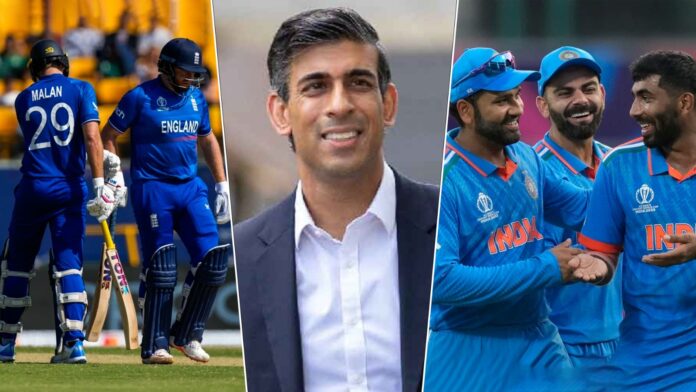In the world of diplomacy and cricket, there are moments when these two seemingly distinct worlds converge. One such instance is the anticipated visit of British Prime Minister Rishi Sunak to India, coinciding with the thrilling ODI World Cup 2023 cricket match between India and England, scheduled to be played in Lucknow’s Ekana Stadium on October 29.
Rishi Sunak’s visit to India primarily focuses on trade negotiations between the two countries. The ongoing trade talks have been linked to potentially positive outcomes, underscoring this diplomatic voyage’s importance. While official confirmation from both sides is still pending, there are strong expectations that Sunak’s visit will materialize.
As the Indian and British negotiators are currently engrossed in the 14th round of talks in New Delhi, it is evident that substantial progress has been made. Reports indicate that a broad understanding has been reached on 24 of the 26 chapters in the proposed trade deal. If these discussions continue to advance in the same direction, it sets the stage for a significant diplomatic breakthrough.
One of the remarkable facets of Rishi Sunak’s visit is his plan to attend the India-England game in the ODI World Cup in Lucknow. Cricket holds a special place in the hearts of Indians, and the ODI World Cup is a celebrated event that unites nations. Sunak’s presence at the game adds a layer of cultural diplomacy, showcasing the shared love for cricket between the two countries.
The background of Sunak’s visit is also significant. During the G20 Summit in New Delhi last month, he had agreed with Indian Prime Minister Narendra Modi to work towards a free trade agreement (FTA). As a result, Sunak accepted Modi’s invitation for a bilateral visit, emphasizing the mutual eagerness to strengthen trade relations further.
While there has been notable progress in the trade discussions, certain contentious matters are holding up the agreement. The UK seeks increased access to the Indian market for items like dairy products, electric vehicles, and Scotch whisky. Conversely, India has concerns about rules of origin for goods and mobility for professionals. The issue of work visas for Indian professionals remains a point of contention.
Despite narrowing differences on many issues, some aspects may require political-level interventions. The complexities of trade agreements often necessitate high-level discussions and resolutions. The willingness to address these matters at the political level reflects the commitment of both countries to reach a mutually beneficial agreement.






















